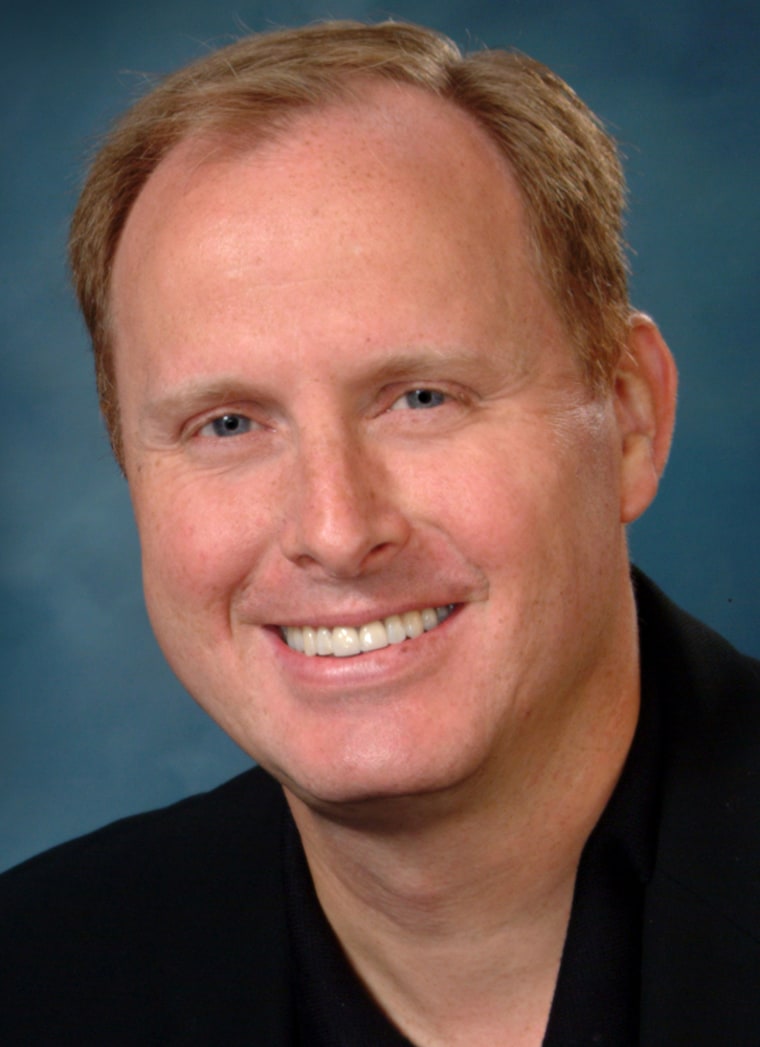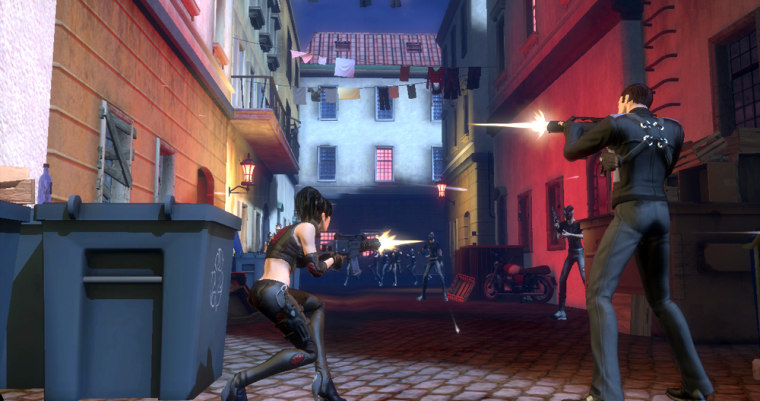Not long ago, before “World of Warcraft” became the 800-pound gorilla of online games, there was “EverQuest.”
It wasn’t the first massively multiplayer online role-player game. But in 1999, when Sony Online Entertainment released the “EverQuest,” it was the first to break through in a big way to the U.S. market.
Players went crazy for the fantasy-themed game set in the fictional world of Norrath. “EverQuest” won many awards, legions of fans and nicknames such as “NeverRest” and “EverCrack.” It spawned a sequel, “EverQuest II” and many imitators, including, some say, “World of Warcraft.”
But Sony Online has seen its online gaming market leader position erode in recent years. “WoW,” which launched in late 2004, now commands the lion’s share of the MMORPG market.
John Smedley, one of the original creators of “EverQuest” and the president of Sony Online since 2000, has watched the rapid changes in the space his company once owned, and he believes it’s time for a change.
In his keynote speech at an online game conference in Seattle recently, Smedley spoke of the need to reinvent the MMO — and he says the two new games his company is developing, “The Agency” and “Free Realms,” will do just that.
“The Agency,” which made our Top 5 most anticipated games list, is a mature-rated spy-themed online shooter that will launch on the PC and the PlayStation 3 sometime in 2009. “Free Realms” is an online game aimed at the 9-to-14 crowd, which offers pet-raising and gardening along with the usual male-centric combat fare. Smedley says the game will be free to play on the PC and PlayStation 3, with a monthly subscription price for enhanced access.

In an interview following his speech, I asked Smedley why he believes the online-game genre — which seems to be doing just fine — needs a shakeup. He also discussed why he hopes to bring more young girls into online gaming and what the company has learned from Blizzard’s success with “WoW.”
The topic of your speech was reinventing the MMO. Why does the genre need reinventing?
For the past nine years, it’s been the same formula. Basically, kill stuff. And if we’re going to expand the audience to one that’s a lot broader, both in age range and sex, we’re going to need to reinvent. And we’re going to need to make efforts to reach girl gamers, to reach younger gamers … it’s something we need to be conscious about.
You’ve been in the MMO space for a really long time. From your vantage point, how have things changed, from “EverQuest” to today?
Everything’s gotten a lot better, higher production values, the competition in this space has gotten very substantial, obviously. “World of Warcraft” is a terrific and formidable opponent. But I would also say the games have gotten more fun over time and I’m really pleased to see more and more people starting to play.
I’ve got four kids, and my oldest two actually play MMOs. They play probably because I’m their dad, but also because they hear about them from their friends.
Where does the MMO space go from here?
A couple of different places. First, it’s going to go into different genres. So, with “The Agency,” we’re going into the shooter genre. That’s a huge, huge genre that’s basically untouched. And then, I think it’s going to go into a broader age range, and demographic in terms of male/female. We think we’re going to see a lot more of that. You’re starting to see a lot more of that now, with Barbie.com, which I’m happy about mostly because I have three girls.
You’d mentioned “WoW” and Blizzard … how has Sony Online learned from Blizzard’s success in this arena and what have you learned from “WoW?”
We’ve always really loved the Blizzard guys, really loved their games … we’re very friendly with them. What I’d say we’ve learned is that this audience is very, very big. You get a name brand like Blizzard in there and they make a great game and you can make a very large revenue base (quickly).
The biggest thing that I think that we’ve learned is that they’ve shown that polish is probably the king of everything. In the early days of this industry, it was new, so putting something out there that was untested … (the audience) was a little bit more forgiving. In this day and age, you’ve got to spend money to get the production value and polish the game. And that’s something that we’re really focused on.
A lot of people say that “World of Warcraft” is just a more polished version of “EverQuest.”
They do. And, to some extent that might be true. But it’s also true that they’ve made an amazing world, and it’s a lot of fun, and my hat’s off to them.
That said, they really own this space, so I’d imagine that Sony Online Entertainment would like to take it back, or at least a bigger piece of it.
It depends on how you look at it … “Runescape” has more active players, 11 million active players. There are plenty of games in Asia that are just as big, and “Runescape” is a great example of a more English-centered game. It’s got most of its base in the U.S., and they’re just starting to localize for different languages.
I think there’s a lot of room there that “World of Warcraft” isn’t touching. Certainly they have the same male-female (demographic) that we do. There’s not a lot of girls playing “World of Warcraft.”
Are you going after the “Club Penguin” market with “Free Realms?”
No, we’re going after the “Runescape market” … with 12 being the primary age that we’re targeting really hard. But we want it to be 50/50, and we’re spending the money really hard to get it in both places … both boys and girls playing. Studies that we’ve looked at have shown that (younger girls) don’t just want to kill stuff.
It’s a risk, though, to offer this game for free, because this age group doesn’t have credit cards.
You know what, there are so many proven successes in this space. “Runescape” is a great example: $4.99 a month, free gameplay. They’ve more than 10 million active players and over 1 million paying. The free players can do microtransactions (use real money to make in-game purchases). And we will have short video interstitials, so we think we’ll be fine on that front.

I’ve watched my son register for something, walk over to my wife’s computer — in front of me, mind you — intercept the e-mail and respond to it, and then walk back over to his computer. It just goes to show that you’ve got to go to great lengths, which is why I like “Club Penguin.” What we want to do is put that kind of safety into a world that ‘tweens can enjoy.
I was at a talk at this year’s Game Developer’s Conferenceabout these kid’s games … someone got up and said to the panel: “I want to thank you for training my future customers.” And everyone in the room sort of laughed nervously, but it’s true, isn’t it? These games are training future MMO players.
If you think about McDonald’s — and it’s scary to think about it — McDonald’s really goes after the whole kind of lifecycle of customers. That’s exactly what we’re doing here. We want a game that’s aimed more at ‘tweens, and then when they get older, they naturally graduate into more complicated gameplay. We want to have games that fit well into all of those demographics, and that’s how I think we can broaden the market as a whole.
How much is “Free Realms” costing to develop?
I can’t get into that, but … I can give you a range: $20 million to $30 million to launch the game.
Is “The Agency” in the same range?
“The Agency” is a lot higher … between $50 million and $75 million to launch, including infrastructure and everything.
How much is the user going to pay to play “The Agency?” Is it also free to play?
That one we’re not sure. The reality is, when “Free Realms” launches, I think it’s a game-changer. And I think, in the U.S. market, I think it’s going to be one that moves a lot of games in that direction, including our own.
You’ve said that you want to expand your audience beyond the 31 year-old male.
We do, and that’s what “Free Realms” is all about. But that doesn’t mean we’re going to stop making games for that core constituency. And we also want to push the bar a little bit. I don’t think we could pretend that we’re going to get a 50-50 (male-to-female) audience in “The Agency” because we don’t expect it.
Do younger gamers own PS3s?
Their big brothers and sisters do. We think it’ll be the third year of hardware cycle and we think it’ll be a good time for there to be more of an introduction of younger-skewing games.
Why haven’t Microsoft or Nintendo gone after this space?
I honestly don’t know. I know Microsoft has tried several times. They’ve canceled a bunch of MMOs. For the life of me, I don’t know. But it’s something we’re interested in, so, good for us.
